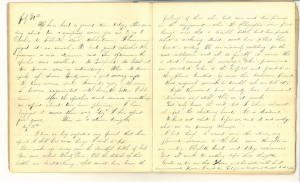Author: Emilie E. Palmer
Date: 18 August 1861
Location: Emilie E. Palmer 1859 Diary, Record Group 19/2, Oberlin College Archives
Document Type: Autograph Document
Introduction:
Palmer details her reaction to the Battle of Bull Run, one of the first major battles of the Civil War. In Helen Finney Cox’s description of the Union women’s participation in the Civil War, she writes about the loss of Bull Run weighted on homefront women; “After the first battle of Bull Run, the humiliation of defeat was more keenly felt at home by the women than it was in the army itself … They draped their houses with black in mourning for the dead and they walked the streets wringing their hands, tears streaming down their cheeks, exclaiming, “How could they run! Our men run!” Of couse [sic] the great majority of women … staid [sic] quietly in their homes, going the monotonous round of their daily duties. How heavy their hearts were with anxiety and their eyes with unshed tears no one knew. The weary waiting for news after a battle wore away their very lives or the sudden reception of a telegram made them faint with fear.”1 Palmer’s entries speak directly to the heartache and waiting Cox describes, even during an early battle like Bull Run. She begins to question the death and destruction of war, and her anxiety about what is to come after this tragedy is clear.
Document Text:
I have so long neglected my journal that I am afraid I shall lose some things I wish to keep. Three weeks ago today was the dreadful battle of “Bull Run[”]2 now called Bloody Run. Oh! The details of that battle are head-sickening, what must have been the feelings of those who had near and dear friends in the engagement. When the telegraphic wires first brought news that a terrible battle had been fought—what a sickening dread must have filled their hearts, waiting, Oh so anxiously watching for the next intelligence and all too quickly it comes. He is dead—among the missing—taken prisoner, or was wounded, taken to the hospital and perished in the flames kindled by worse the barbarous fiends. This anguish must be terrible, who can tell it?
Eight thousand have already been buried at Manassas3 and still they are at work.4
God only knows the end but I believe we must all feel the chastening hand. It is deserved.
We know not who is before us, and do not realize what we are passing through.
I had thought to record some other items, my pleasant excursion to the lake, some thoughts on my reading, Charlotte Bronte5 and today’s occurences [sic], but all sink to nothing before these thoughts.
Cordie writes me this Hosea6 and his sister will be at commencement. How can I meet him. God give me courage and strength to do right.
Transcribed by Frances Casey
1Helen Finney Cox, “Woman’s Share in the Civil War.” 1891. Cochran Family Papers, RG 30/8, SG 2, Series 6, Subseries 3, Box 3, Oberlin College Archives, 11.
2The Battle of Bull Run occurred on 21 July 1861 in Fairfax County and Prince William County, Virginia. It resulted in 4,878 total estimated casualties, and was considered to be a Confederate victory. (“Bull Run,” Civil War Trust: Saving America’s Civil War Battlefields, Web address, accessed 12 March 2015).
3The Battle of Bull Run is also known as the “First Battle of Manassas,” after the nearby town of Manassas, VA. The number of estimated casualties is 4,878—not “Eight thousand,” as Palmer believed. (“Bull Run,” Civil War Trust: Saving America’s Civil War Battlefields).
4Palmer frequently indented in this entry.
5English novelist and poet, known for Jane Eyre.
6Palmer’s possible first love. See 20 October 1861 Emilie E. Palmer diary entry for context.
